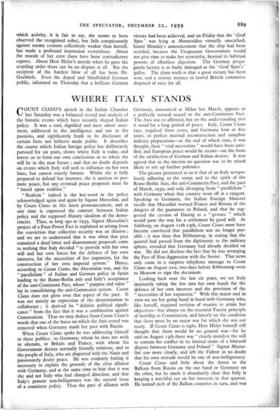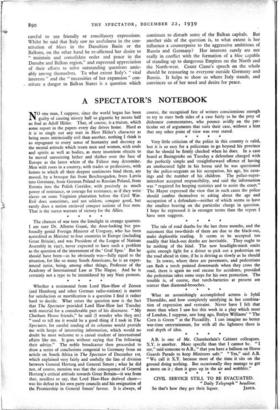WHERE ITALY STANDS
COUNT CIANO'S speech in the Italian Chamber COUNT Saturday was a balanced record and analysis of the historic events which have recently shaped Italian policy. It was a cool, dignified and most adroit state- ment, addressed to the intelligence and not to the passions, and significantly frank in its disclosure of certain facts not hitherto made public. It describes the course which Italian foreign policy has deliberately pursued for six years, shows where Italy is today, and leaves us to form our own conclusions as to where she will be in the near future ; and that no doubt depends on events which Italy will seek to influence on her own lines, but cannot exactly foresee. Whilst she is fully prepared to defend her interests, she is anxious to pro- mote peace, but any eventual peace proposals must be " based upon realities."
" Realism " indeed is the key-word in the policy acknowledged again and again by Signor Mussolini, and by Count Ciano in this latest pronouncement, and at one time is expressed the contrast between Italian policy and the supposed illusory idealism of the demo- cracies. Thus, as long ago as 1933, Signor Mussolini's project of a Four-Power Pact is explained as arising from the conviction that collective security was an illusion ; and we are to understand that it was when that pact remained a dead letter and disarmament proposals came to nothing that Italy decided " to provide with her own will and her own forces for the defence of her own interests, for the necessities of her expansion, for the construction of her own imperial system." Hence, according to Count Ciano, the Abyssinian war, and the " parallelism " of Italian and German policy in Spain leading to the Rome-Berlin axis and Italy's acceptance of the anti-Comintern Pact, whose " purpose and value " lay in consolidating the anti-Communist system. Count Ciano does not gloss over that aspect of the pact. It was not merely an expression of the determination to collaborate ; it derived its " definite political signifi- cance " from the fact that it was a combination against Communism. Thus we may deduce from Count Ciano's words that one of the bases on which the Axis rested was removed when Germany made her pact with Russia.
When Count Ciano spoke he was addressing himself to three publics : to Germany, whom he does not wish to alienate, to Britain and France, with whom his Government desires normally friendly relations, and to the people of Italy, who are disgusted with the Nazis and passionately desire peace. He was evidently feeling it necessary to explain the grounds of the close alliance with Germany, and at the same time to hint that it was she and not Italy who had changed direction, and that Italy's present non-belligerence was the natural issue of a consistent policy. Thus the pact of alliance with Germany, announced at Milan last March, appears as a perfectly natural sequel to the anti-Comintern Pact.
The Axis was re-affirmed, but on the understanding that it stood for a long period of peace. Italy, Count Ciano says, required three years, and Germany four or five years, to perfect internal reconstruction and complete military preparations—at the end of which time, it was thought, their " vital necessities " would have been satis- fied, and European peace would be secure—on the basis of the satisfaction of German and Italian desires. It was agreed that in the interim no question was to be raised likely to stir up further polemics.
The picture presented to us is that of an Italy scrupu- lously adhering to the terms and to the spirit of the Rome-Berlin Axis, the anti-Comintern Pact, and the pact of March, 1939, and only diverging from " parallelism " with Germany when that country went off at a tangent. Speaking to Germany, the Italian Foreign Minister recalls that Mussolini warned France and Britain of the dangers of the guarantee to Poland, and that he sug- gested the cession of Danzig as a " gesture " which would pave the way for a settlement by good will. At Salzburg, on August I1th-I3th, Count Ciano must have become convinced that parallelism was no longer pos- sible ; it was then that Ribbentrop, in stating that the quarrel had passed from the diplomatic to the military sphere, revealed that Germany had already decided on war. He did not disclose the fact that he was arranging the Pact of Non-Aggression with the Soviet. That news only came in a surprise telephone message to Count Ciano on August 21st, two days before Ribbentrop went to Moscow to sign the document.
Looking back over the last six years, we see Italy insistently taking the law into her own hands for the defence of her own interests and the provision of the " necessities of her expansion." With this major end in view we see her going hand in hand with Germany who, like herself, required revision of treaties to attain her objectives—but always on the essential Fascist principle of hostility to Communism, and latterly on the condition that there must be no major war for which she was not ready. If Count Ciano is right, Herr Hitler himself still thought that there would be no general war—for he said on August 13th there was " clearly manifest the will to contain the conflict in its limited terms of a bilateral dispute between Germany and Poland." Signor Musso- lini saw more clearly, and left the Fiihrer in no doubt that his own attitude would be one of non-belligerency.
Count Ciano said little about the threat to the Balkans from Russia on the one hand or Germany on the other, but he made it abundantly clear that Italy is keeping a watchful eye on her interests in that quarter. He named each of the Balkan countries in turn, and was careful to use friendly or conciliatory expressions. Whilst he said that Italy saw no usefulness in the con- stitution of blocs in the Danubian Basin or the Balkans, on the other hand he re-affirmed her desire to " maintain and consolidate order and peace in the Danube and Balkan region," and expressed appreciation of their efforts to solve outstanding questions amic- ably among themselves. To what extent Italy's " vital interests " and the " necessities of her expansion " con- stitute a danger to Balkan States is a question which continues to disturb some of the Balkan capitals. But another side of the question is, to what extent is her influence a counterpoise to the aggressive ambitions of Russia and Germany? Her interests surely are net really in conflict with the formation of a bloc capable of standing up to dangerous Empires on the North and the North-west. Count Ciano's speech on the whole should be reassuring to everyone outside Germany and Russia. It helps to show us where Italy stands, and convinces us of her need and desire for peace.





































 Previous page
Previous page